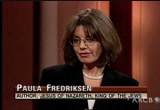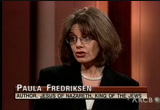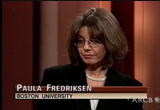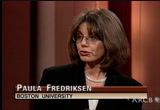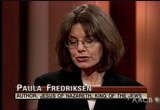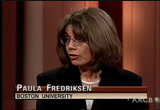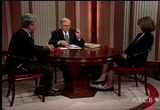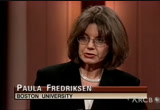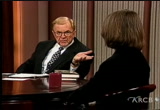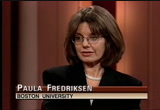tv John Mc Laughlins One on One PBS January 13, 2013 9:00am-9:30am PST
9:02 am
years ago? and the miracle of the virgin birth. is that intended as the literal truth in matthew and luke? the gospels give us one description of the birth of jesus. do archaeology and history give us another? joining us to answer these questions areu.s. open, the aute brand new "jesus of nazareth cunning of the and jeffrey sheler author of the brand new "is the bible truth?" tell us what you think
9:03 am
happened at bethlehem, jeffrey she'ller. >> well when we read two gospels, only two of the four gospels even talk about the birth of jesus and when we read matthew and luke, those two gospels, we are certainly presented with different details surrounding the story of the birth but despite the differences there are several things that clearly come through and those are the important aspects of the story. one, that jesus was born in bethlehem. to a virgin named mary. whose husband, joseph, was of the lineage of david. and this according to the writers of those two gospels was in fulfillment of the hebrew prophesies. so despite very clear and seemingly troubling contradictions in some of the details the more important thing is, i think, the points on which they disagree. >> on the physical -- on the physical details was it an inn or was it a two-story house? >> an inn or a two-story house. that's an interesting question.
9:04 am
there certainly is a theory now that it was a two-story house. that the word that is oftentimes trslated "inn" is a word that really should be translated "house" and that the couple were not turned away by a mean, old innkeeper but rather were let into the guest room of a typical two-story palestinian house. >> or was it the guest room was filled and they were told that they could rest with and sleep with the animals who were, where downstairs? >> the first story, the first floor is typically a place where the animals were kept. consequently, there would be a manger there. >> paula fredriksen, what did jeffrey shela say that you find needs further elaboration or different elaboration from your perspective? >> well, i was thinking of there's also a second century tradition that jesus was born in a cave. i mean, there are all sorts of traditions that grow about
9:05 am
jesus' birth the more christianity develops and when i consider that matthew and luke were probably each written by anonymous christians somewhere, i don't know, between 90-100 and that jesus himself would have been born sometime around 0, that's a lot of room to begin looking to the bible for ideas to express what you think is religioussy important about jesus and that's why i would look at these -- but i think mary was home in nazareth when she had jesus, i don't think she was in bethlehem. >> well, let's go to the basics, first of all, the year. was it not four years before a.d. started? >> well, a.d. starts as a medieval convention. jesus, if he's born -- this is one of the chronological differences between the gospels. if harrod is alive as he has to be from matthew's birth narrative to work we know that harrod died in minus 4. if there is a tax which happens
9:06 am
when corinius is the liggot of syria as luke says, we know that a tax that happened in plus 6. so you have to pick where you want, matthew and luke named different points. >> is there an abundance of evidence forthcoming from archeology and other sources that will settle all of these matters, do you think, upcoming? >> well, it's hard to say. you know, who knows what remained buried in the sands of palestine but -- >> do you draw hope from the rapprochement that may take place between syria and israel? >> i think anything that opens up the land to exploration, archeological exploration is going to be helpful. >> you think there's a lot more there/. >> you don't think it was bethlehem. >> that's right. >> there was a controversial word used by jeffrey sheler a
9:07 am
year ago and that was mary was a virgin at the time she gave birth to jesus, correct, that's what he said? no, jeffrey said that's what the gospel writers said, am i correct? >> that's right. >> quoting the gospels, thank you for the correction, i'm glad to see the principles of scholarship are being enforced here. >> makes a difference. >> you don't believe mary is a virgin or that the gospels make the case that she was a virgin at the time of the birth? >> ctainly both -- matthew specifically and luke more subtly claimed that she is a virgin. mark says nothing. and john says nothing about it. and the reason that both matthew and luke introduced that particular aspect or they have a tradition that states that about mary is because they're reading the jewish bible in greek. >> the jewish bible in greek. what was the language that the -- that was translated, the
9:08 am
original language? jesus spoke in aramaic, correct? >> probably. >> and that was first translated into hebrew? >> the jewish bible is, for the most part, in hebrew. there are a few parts in aramaic. >> then it was translated into greek for the common man. >> for the greek-speaking common jew in minus 200. >> ok. now, it's your contention, is it not, that when the translation occurred between hebrew and greek there was a mistake made. what was the mistake? >> you know, that's augustine's contention too, i'm in good company. >> you mean the saint? >> yes. yes. >> of hippo? >> yes, one of my favorites. this is something that greek-speaking christians were aware of as early as 150. >> what is the word in question? >> the word -- it's like the word for the parthenon because athena was a virgin goddess, the word is parthenos and that's the
9:09 am
word that appears in greek of isaiah 7:14 but it's not the order in the original hebrew. >> what's the word? >> the hebrew text says ama. >> what does that translate to. >> it's the word for young girl which has its own greek word. >> what's the greek word. >> the greek word would be nianis. >> niansus is not parthenos. >> i have three daughters, we hope that young girls are virgins but it's not the same word. >> mary is not a parthenos. >> i don't know if she was or not but the text says -- >> how do you know the hebrew was mistranslated when put into greek. >> hebrew has word for virgin. it's tula and that's not what the hebrew text is. >> all right now, she is attacking the whole notion of the virgin birth of jesus christ.
9:10 am
when she points to this translaws, what do you say about that. >> where i would take issue professor sore fredriksen is assuming because of the greek text, because of that difference empty words between the greek and hebrew text that that's the reason why they included that in their gospels. we don't really know -- we can't say for sure what the reason for their including that element, the virgin birth, into their narratives. one could just as easily assume they were including it because that's what they thought happened. we know that the virgin birth was not a part of the earliest christian preaching. the earliest generation, the earliest decades of christian preaching had to do with the resurrection, the fact that this man who is crucified is our messiah and god raise him from the dead. that was the systems of the early preaching. it was in the succeeding decades as more questions began to arise as the notion of jesus' did i
9:11 am
have vicinity began to really take hold that questions were to arise that well, if he was divine how did that happen? and then questions of his birth became very important questions. it's very clear that, for example, luke went back and had to do research. he had to investigate. he tells us that at the start of his gospel. in order to find out what he calls the exact truth. and the fact that he concluded that jesus was born of a virgin may well be because that was a part of the tradition that he discovered as he went back and did his research. >> do you have thoughts on what you're hearing? >> of course i do. this is my business. >> what are your thoughts? >> two things. one thing, again, augustine points out -- ancient christians for whom greek and latin were their vernaculars knew perfectly well the greek text was different from the hebrew text on this word. augustine says it is a mistranslation but he says the holy spirit puts the translation into greek deliberately looking
9:12 am
ahead to mary's conception. so that's something that rather than deny that there's a problem augustine used it and made another nicer point. >> but that's not scholarship, is it? >> well, i think it's scholarship to acknowledge when there is actually a conflict rather than to deny there is one. >> of course in mythology, greek parnology there is birth from virgins. >> in roman imperial mythtology, augustus mother was a virgin, alexander the great's mother was a virgin. >> you mean in that type of mythtology. >> they didn't allude to isiah because they weren't jews. one way of saying a person is important is to have their mom be a virgin at the birth of the hero. >> who was sells us. >> he wasn't a roman historian, i was a floss fur. >> clus. >> yes. >> he wrote a book on the true teaching he criticized judaism
9:13 am
and christianity. >> what did he say jesus' origin was. >> that's a story about a roman soldier dating mary before,g no foundation in fact? >> no, it's a way to discredit a tradition. >> is there any basis in biology for parthenogenesis, human biology, has it ever occurred? >> before technology, i'm sure technologically we can do all sorts of things. >> before technology. >> before technology do virgins -- how would i know? have i don't know, it seems to me if you're trying to establish the legitimacy of mary being a virgin one thing you would want to inquire is if it's ever happened independently of mythology and technogy. >> well, i would wonder how i'd have access to that information. there is -- >> well, you're among all those boston scholars. what do you do in recreation, don't you ask questions like --
9:14 am
>> no, that tends not to be one of the things we talk about. with my grandmother, yes. with scholars, no. >> so you come down on the side that it was a true virgin bir, correct? >> i think it's very clear that the gospel writers thought so. appear we have no information with which to dispute them. i'm willing to go with it. >> may i say one more thing on this point? one of the things that the gospel writers do and matthew and luke in particular of the four that we have, is that they turn to using the bible, the jewish bible, the only one there is when they're writing, which is an ancient, ancient text, and they use it for factual information about the biography of jesus. it would be a little bit lik you deciding to write a biography of jfk and using king leelear for factual biographical information for jfk. >> what were they trying to do? apparently they were not reporters on the scene.
9:15 am
they were not doing a reportial account, they were not giving you a who, what, when, where, why, correct? >> correct. >> they were doing this type of once-removed biography. >> well, it's not like they're sloppy researchers. >> how many general rations elapsed? >> between matthew and lucas, for argued and defensible reasons scholars think that matthew and luke were probably written just before the turn of the first century. >> i thought it was closer to 47 years. >> after what? >> after his death. >> well, he died around -- no, mark is the earliest one and mark seems to have been written around the destruction of the temple. >> i guess what she's saying is a lot of this is hand me down, verbal accounts, which ofourse verbal accounts, which ofourse certainly know that, correct? >> well, today it certainly is not like the-mile-per-hour
9:16 am
dame -- the children's parlor game of telephone where you pass a saying around the circle and by the time it gets to the end it's been corrupted. go back to the historical context, it was a very oral culture. and we're only talking, here, maybe 40 or 50 years. i can certainly remember things 40 years ago. and 30 years ago quite cereal. and something of this monumental importance i probably would remember it quite vividly. but in that culture where member morization and oral transmission was -- member morization and oral transmission was a longstanding part of the transition i don't think we can assume that they were unable to keep the facts straight. >> i think by this time our audience is consumed by curiosity about both of you and paula fredriksen, i note that you were born in that great state of rhode iand. where i hail from. kingston. the uri, you didn't go to uri, though, you went to wellesley. and then you went on from there
9:17 am
to where? >> oxford. university. >> how many years were you there? >> one. >> what did you study? >> theology. >> then where did you go? >> i went to new jersey. >> and what did you study there? >> at princeton i studied the origins and history of ancient christianity. >> you taught in a number of institutions. would you list those for us? >> i taught at princeton briefly, i taught at u.c. berkeley, university of pittsburgh, for a year i was at the hebrew university at jerusalem and currently at boston unive >> you have? >> yes, indeed. >> i got my degree in '79. >> you're the professor of the appreciation of scripture, you've been doing that for what? >> since '90. >> for nine years. three books to your credit? >> that's true. >> i notice that you retreated from some of your statements from your first book, "jesus of nazareth, king of the jews." what changed in the 11 years
9:18 am
between the publication of these two books. >> my first book was "from jesus to christ." and that was published in 1988. and "jesus of nazareth" was published a few months ago. what changed is time elapsed, i continued to work in the field and learned more. >> isn't it the all-important question of why jesus was killed, you now believe he represented a limited threat to public order during the festival of passover rather than a major threat to roman rule? >> i don't think anybody thinks he, including pileate that jesus represented a major threat to roman rule. >> well, then why was he crucified? >> because of the disruption, potential for disruption he presented that passover. but he's in jerusalem, that's not roman rule. >> well, if it's a small uprising, if it's a small dislocation that he creates he would not have been crucified. crucifix was reserved -- correct me if i'm wrong -- >> yes.
9:19 am
>> you're much more up to date on this than i am, the crucifix was reserved for public displays in order to gain social control exactlyrue. >> but there was no disruption according to your current thinking, is that correct, of any magnitude? >> well, i think there was a potential for public disruption but i also think that pileate new perfectly well even though he crucified jesus that jesus was not a revolutionary figure and that's because of the other fact. and we have so few real fact. the other fact that we have historically is that even though jesus was executed as if he were an insurrectionist none of his followers were. >> right, which is another indication he was not a threat to roman rule. so why did pileate get into the act? >> that's the question. because if he was just doing a favor for the high pryce which is how the gospels presented it, he could have killed jesus much less publicly. >> he could have murdered him quietly. yes.
9:20 am
>> did you he didn't do that. do you have any thoughts on this? >> i don't disagree with that at all. i think that the palm sunday demonstration, i think, was also sort of a red flag to the authorities in jerusalem. certainly the acclaim that we read was given to jesus and they were using terms like "king of the jews" "messiah." >> so he went to pileate and said can you do something like that but he may not have known that pileate was contemplating crucifix, correct? >> i think kiafis was concerned that if there was going to be trouble and that trouble resulted in any sort of military or forceful reaction against people who were gathered in jerusalem for the holy days tha kiafis wanted to make sure that it didn't explode and the result being perhaps repression of their own authority.
9:21 am
>> and this is the way we treat troublemakers in order to gain social control. did you find any evidence of interrogation by the high pryce or by his associates? >> well, there were two different traditions preserved in the gospel material. one is that there are one or even two full trials of the prices, chief prices and elders. >> what is your crucial? >> oh, i don't know of anybody that thinks that probably happened. >> that didn't take place according to what your scholarship shows, correct? >> it would be a surprise. but the gospel of john says something else. >> what? >> the gospel john has something entirely different. the gospel of john has no nitrile. the gospel john after jesus is ambushed simply has jesus led to a bri conversation before akafis who asks him about following and teaching and then
9:22 am
goes to pileate. considering how busy the prices were at pass overwhen the temple was standing john's depiction is intrinsicically more plausible. >> well, all this seems to say that the brame, if that's the right word, the culpability for christ's death that has been affixed to the jews over the years that has spawned antisemitism,hat that is unfounded on the basis of scholarship because the only connection between pilate and the san hedron was kifis who said to pileate saying we have something serious and it was pileate who ordered the crews i figures. am i getting too far ahead of you. >> you're bledding a lot of big
9:23 am
ideas but that's fun, it's ok. the interesting thing when you get the jews blamed for jesus' death that again is an accusation that develops in the second century from the way that are readying the gospel stories. >> rather than the facts. >> how do people know facts? how well do we know facts now? from but you say all of your scholarship is based on facts and the only facts you know about jesus' death is sometime around 30 a.d. during the feast of passover, he was crucified under pilea is murky as to why he was crucified, we're on the threshold of the third millennium of christianity which is a miracle in itself. what are some of the more exotic interpretations of the bible beyond funk that we can expect and will they take hold, you want to talk about, for example, the bible code, we have very little time. >> the bible code tells us that in modern times, now that we have computers, we finally discovered the real bible beneath the bible. that is a hidden code, hidden.
9:24 am
the -- in equidistant letter sequences within the text of the bible presumably by god or some other intelligence. >> has it been discredited? >> it has been in my opinion discredited by mathematicians and computer scientists who have explored the arguments and found them lacking. >> do you think traditional christianity will survive the exotic forms we see today? >> i think the bible will always be the most important book in western culture and people will always interpret it. >> jeffrey sheler -- born in grand rapids, 50 years of age, married, two children. you're a presbyterian, your politics are independent. where did you go to college? >> i went to michigan state university for journalism. georgetown university for theological studies. >> did you get a degree from georgetown. >> master's degree in liberal studies. >> in liberal studies. that includes, what, theology? >> theology, philosophy, yeah.
9:25 am
>> do they teach you shakespeare? >> i managed to stay away from shakespeare at the master's level. >> you'd be comfortable there now because i understand even for literature majors shakespeare is not a mandatory subject, do you believe that? what has happened to these? >> reporter, covered politics, weekly pbs series john ander nathalie. "u.s. news and world report," religion editor. your book to your credit. >> my first book. >> and still working at "u.s. news & world report." >> i still am. >> if i mention the name funk to you, who is he, robert funk? >> he's a bible scholar, new testament scholar who is founder and leader of a group called jesus seminar. a group of scholars for the last 15 years have been exploring the historical jesus. >> yeah, does he have very much
9:26 am
standing in the academic community paula fredriksen interhe represents the school of representation. >> she's also a diplomat. well, funk is saying some pretty vacanting things. and it appears as though he is off the charts, does it not? he's organized a semiannual seminar that you speak of. and his forum debunks the sayis from the cross, the virgin birth, the resurrection, jesus' miracles and he sees jesus as a sort of jewish socrates, almost a lenny bruce character, is that right. >> that's right. >> you find no evidence in any of your scholarship, by the way, that jesus was a revolutionary, correct? interi find counterevidence. >> counterevidence? if yes is it he was not a revolutionary nor an insurrectionist. >> not that i can see from the documents. >> was jesus aonservative? >> i don't think so. >> well, in what sense was he
9:27 am
unorthodox? >> well, i think that in what sense is what he saying somehow alarming or gripping or revolutionary? >> did he support the tora. >> oh, yes. >> oh, yes. so he did root himself in sources, correct? >> he was a jew. >> that's what i'm getting at, was he not basically conservative. he was -- go ahead. >> well, just it depends on which jew you ask. but it's -- you know, he's certainly within the -- a penumbra of typical jewish practice in the first century but there's something that makes him stand out and that's his belief that the kingdom of god is at hand. >> i hate to say it because this show is -- to me at least -- very interesting, very rewarding. and i want to thank you, jeffrey sheler i want to thank you, paula fredriksen, we're out of time.
141 Views
IN COLLECTIONS
KRCB (PBS) Television Archive
Television Archive  Television Archive News Search Service
Television Archive News Search Service 
Uploaded by TV Archive on

 Live Music Archive
Live Music Archive Librivox Free Audio
Librivox Free Audio Metropolitan Museum
Metropolitan Museum Cleveland Museum of Art
Cleveland Museum of Art Internet Arcade
Internet Arcade Console Living Room
Console Living Room Books to Borrow
Books to Borrow Open Library
Open Library TV News
TV News Understanding 9/11
Understanding 9/11





